How Tennessee AgrAbility Helps Farmers With Physical Challenges
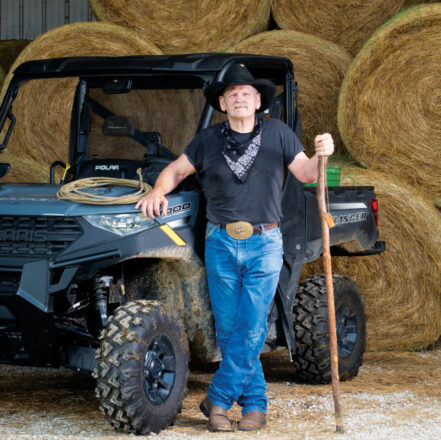
Dennis Martin received a utility vehicle through the Tennessee AgrAbility program to help him get around his farm in Waynesboro. Photo credit: Nathan Lambrecht
On Oct. 1, 1977, Dennis Martin’s life changed forever.
As he walked across the yard at a cookout, a drunk driver sped through a stop sign and ran over him. The drunk driver stopped, parked on top of Dennis, and backed over his body. He spent three months in the hospital recovering from his injuries, and 2 ½ years doing intense physical therapy. He no longer had a hip joint, and walking was very challenging.
“Because of my hip, I have to take very small steps and turn sideways to bring my second leg along,” Dennis says. “That takes me a long time to do anything, let alone to get up and down these hills.”
This never stopped his longtime dream to become a rancher. Over time, he bought land in his home of Osceola County, Florida, where he had Brangus-influenced cattle. As he approached retirement, he began looking for farms in Tennessee and found his ideal farm in Waynesboro.
“We loved Tennessee from previous vacations and wanted to be in the Bible Belt,” Dennis says. “This farm came available, and I made an offer before even seeing it in person.”
But after the move, he struggled to manage the farm due to his injury.
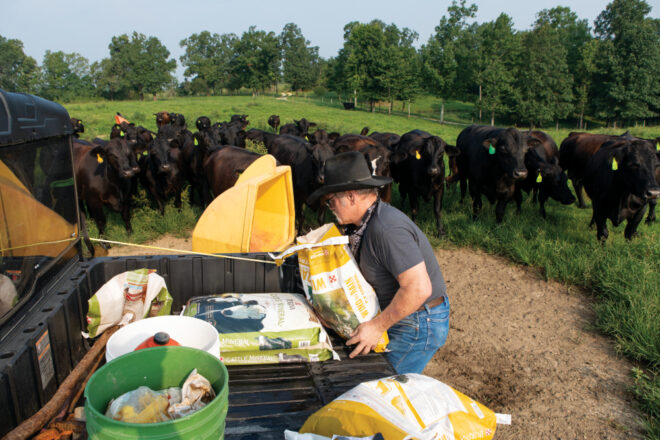
Photo credit: Nathan Lambrecht
Farming Made Functional
“Dennis and I had discussed that he needed a vehicle to get around the farm better,” says Keri Martin, Dennis’ wife of more than 30 years. “I saw an AgrAbility ad in one of the local papers about four years ago.”
The Martins connected with Joetta T. White, Extension area specialist with the Tennessee AgrAbility Project, a grant-funded program through USDA National Institute of Food and Agriculture (NIFA) for which UT/TSU Extension provides leadership. AgrAbility doesn’t specifically purchase assistive technology devices for its farmers, but Tennessee AgrAbility staff, like White, work with farmers and other resources to find the help they need.
Read More: Weathering the Storm: Farmers Face Floods, Other Challenges
For Martin’s specific case, White referred him for services with Tennessee Vocational Rehabilitation Services and Tennessee Client Assistance Program to help him continue farming through the use of assistive technology.
“Tennessee AgrAbility staff is happy to go out and do the work to try to find the solution to farmers’ problems,” White says. “Sometimes that includes contacting local agriculture businesses to find the necessary funds to help our farmers offset costs.”
In spring of 2021, Dennis received a utility task vehicle (aka a side-by-side) to assist him around the farm. The Tennessee Vocational Rehabilitation Services were able to provide this vehicle based upon White’s referral.
“Thank you isn’t enough to say to AgrAbility for how much they helped me on my farm,” Dennis says. “Before my side-by-side, I felt so helpless.”
He gained his independence, and his wife gained peace of mind.
“In essence, AgrAbility has given Dennis his legs back,” Keri says. “For me personally, it was a huge relief. Dennis is now able to get to areas on the property that he was previously unable to reach. He can now easily rotate the cows from pasture to pasture using the side-by-side to get around.”
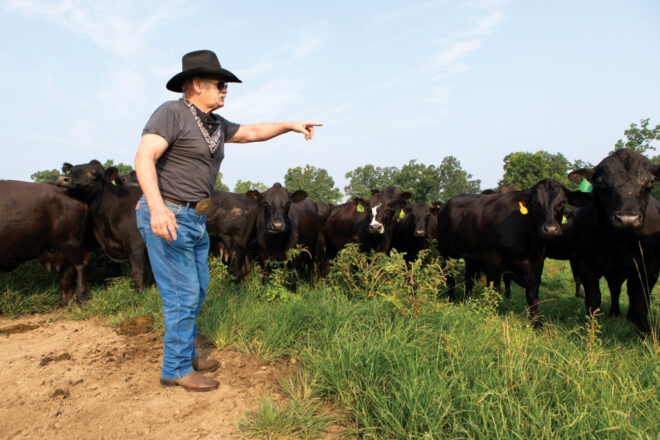
Photo credit: Nathan Lambrecht
Helping Veterans Turned Farmers
Military veterans make up a large part of Tennessee AgrAbility’s demographic. In the 20 years since 9/11, many veterans with disabilities have become farmers, as being highly trained, self-disciplined and mission-oriented are all skills that translate well into farming.
Tennessee AgrAbility is one of the founding members of the Farmer Veteran Coalition of Tennessee (FVC of TN) chapter, which has more than 1,000 members. AgrAbility staff serve on the ag advisory committee for FVC of TN, representing UT/TSU Extension’s Tennessee New Farmer Academy. AgrAbility has referred more than 100 veterans with disabilities to participate in the academy.
Read More: How One Tennessee Veteran Went From the Army to Agriculture
“We introduce veterans and beginning farmers to many of the Extension master classes and USDA programs,” says Eileen Legault, who works with the eastern half of the state conducting outreach education for AgrAbility. “It is important to find ways for disabled veterans to adapt and overcome their challenges. AgrAbility breaks down barriers for all farmers with disabilities.”
More Info
U.S. Navy veteran Ben Fleenor began farming nine years ago with his wife, Lorie, an eighth-generation farmer who grew up on Magna Vista Farm in Sullivan County. He now serves as the Tennessee Farm Bureau Federation board member on the FVC of TN chapter, of which he is also a member, and helps connect veterans who want to farm. Through his advocacy role, Fleenor reminds farmers to be stewards of their land and implement good practices on their farms.
“Contact your local Extension office with farming questions. Also call your USDA office, such as Natural Resource Conservation Services,” Fleenor recommends. “You are your biggest advocate, and (it’s important) to follow through with all of the veteran and beginning farmer programs available.”
Through the efforts of Legault, White and others involved with Tennessee AgrAbility, veterans and other farmers with disabilities are getting the help they need with tractor lifts, platform chair lifts, tracks on wheelchairs, tracks on loaders and more.
“We see so much diversity in the farmers we help in their disabilities,” White says. “AgrAbility can help the farmers, farm family members, youth and farm employees. The possibilities are endless in helping farmers overcome their physical challenges, and we are happy to get to assist.”
All About AgrAbility
AgrAbility is a collaboration between the University of Tennessee Extension, Tennessee State University Extension, STAR Center Inc. and USDA National Institute of Food and Agriculture. Tennessee AgrAbility helps farmers, farm workers with disabilities and their family members by providing support, resources and equipment that allow them to be independent and productive. However, they do not take the traditional meaning of disability, but “any physical condition that hinders farming,” according to the website. Since 1994, AgrAbility has helped more than 1,200 Tennessee farmers.
AgrAbility requirements are broad and meant to help farmers with farms of various sizes, impairments and needs. Farm size is minimum of 1 acre, including gardens. Impairments include, but are not limited to, arthritis, spinal cord injuries, paralysis, back impairments, amputations, brain injury, visual impairments, hearing impairments, disabling diseases, cerebral palsy, respiratory impairments and head injury. The injuries do not have to be farm-related.
If you or a farmer you know has been struggling with a disability on their farm or in their garden, contact Joetta T. White at jwhit102@utk.edu or (731) 855- 7656; Eileen Legault at agrability@tennessee.edu or (865) 200-4527; or Finis Stribling III at fstribling@tnstate.edu. To learn more, visit agrability.org.





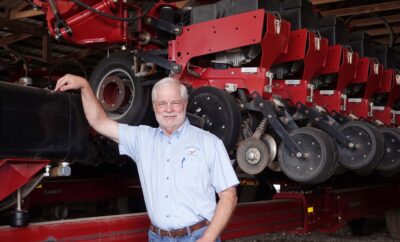
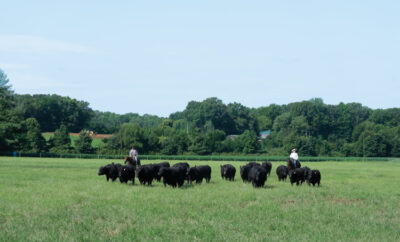
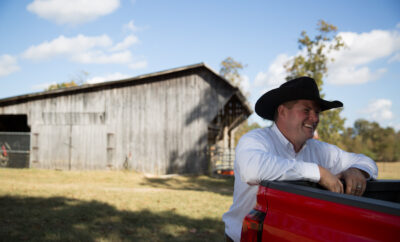







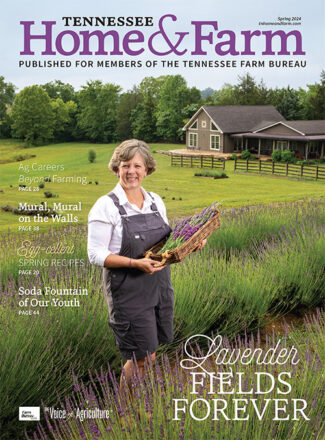
Leave a Comment